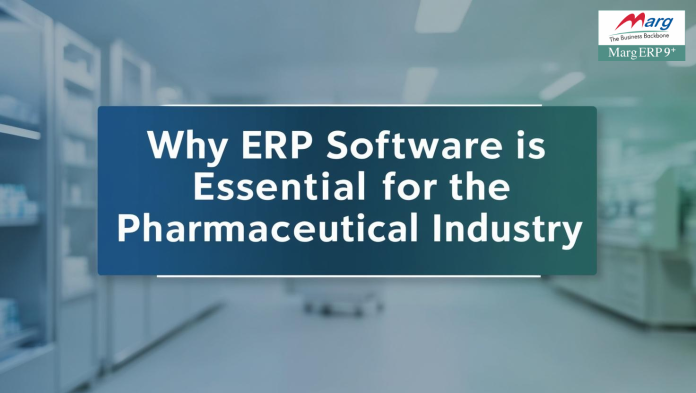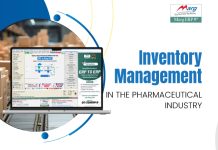In the pharmaceutical industry, precision, compliance, and efficiency are not just important—they are crucial. Whether managing inventory, handling regulatory compliance, or ensuring smooth distribution, every process within the industry must operate seamlessly. This is where Enterprise Resource Planning (ERP) software comes into play. For pharmaceutical businesses looking to streamline their operations and stay ahead in an increasingly complex and competitive market, ERP systems are indispensable. In this article, we explore why ERP software is essential for the pharmaceutical industry and how it helps in achieving operational excellence.
What is ERP Software?
ERP (Enterprise Resource Planning) software is an integrated suite of applications that businesses use to manage and automate core business processes. In the pharmaceutical industry, ERP systems are designed to help companies track and manage everything from inventory to regulatory compliance, financial reporting, production, and supply chain activities. The integration of various processes into a single system provides businesses with real-time data, enhanced visibility, and better decision-making capabilities.
The Role of ERP for Pharmaceutical Industry
The pharmaceutical industry operates under unique conditions—strict regulatory requirements, intricate supply chains, and high demands for product traceability. With so many factors in play, having a reliable and integrated system is essential. Let’s take a closer look at how ERP software meets the specific needs of this industry:
Streamlining Pharmaceutical Inventory Management
Pharmaceutical inventory management is one of the most challenging aspects of running a pharmaceutical business. With the need to track hundreds or thousands of SKUs, ensure proper storage conditions, and handle a range of regulations, it’s easy to see how things could go wrong.
ERP software for pharmaceutical inventory management ensures that products are always tracked from production to distribution. It provides real-time insights into inventory levels, manages expiry dates, and helps companies stay compliant with regulations like the Good Manufacturing Practice (GMP). Moreover, ERP systems can help automate the ordering process, alerting managers when stock levels are low or when products are approaching expiration.
By using pharmaceutical inventory management software, companies can optimize their supply chain, minimize waste, reduce stockouts, and improve service levels.
Improving Regulatory Compliance
Pharmaceutical companies must adhere to rigorous regulations set by authorities such as the FDA (Food and Drug Administration) or EMA (European Medicines Agency). These regulations cover everything from drug production to distribution and require extensive documentation and reporting. Non-compliance can result in fines, product recalls, and significant damage to a company’s reputation.
ERP systems are designed to help pharmaceutical businesses stay compliant by integrating compliance features into their workflows. For instance, many ERP solutions come with built-in modules for tracking batch numbers, product serialization, and labeling requirements. They also support audits by providing accurate records and ensuring that all processes meet the required standards.
In addition, ERP systems ensure that companies can easily update their practices as regulations evolve, reducing the risk of falling behind on compliance matters.
Enhancing Traceability and Transparency
Traceability is another critical aspect of the pharmaceutical industry. From raw material sourcing to the final distribution of products, every step of the process must be meticulously tracked to ensure product quality and safety. This is particularly vital in the event of a recall, where quick identification of affected products can save lives and mitigate the impact on a company’s brand.
ERP software enables pharmaceutical businesses to maintain full traceability from manufacturing to distribution. With detailed records of every transaction, batch, and product movement, ERP systems provide visibility into the entire supply chain. This transparency not only aids in regulatory compliance but also boosts customer confidence in the products.
Optimizing Manufacturing and Production
Production in the pharmaceutical industry requires precision and careful planning. Any errors in production or delays in scheduling can lead to inventory shortages, missed deadlines, or regulatory violations. By integrating all aspects of production into a single platform, ERP systems help businesses optimize manufacturing workflows, reduce waste, and ensure consistency in product quality.
Key functionalities of ERP systems include production scheduling, quality control management, and tracking production costs. These features help ensure that manufacturing runs smoothly, products are produced on time, and operations are cost-effective.
Managing Finances and Accounting
Managing the finances of a pharmaceutical business can be complex due to the various cost factors involved—research and development (R&D), production costs, regulatory compliance costs, and distribution expenses. ERP software helps by automating financial processes such as invoicing, budgeting, and reporting. This not only ensures accurate financial records but also reduces the risk of human error.
With ERP software, pharmaceutical businesses can track expenses, generate financial statements, and analyze financial performance in real time. This enables businesses to make informed decisions, optimize their budget allocation, and improve overall financial health.
Improving Customer Relationship Management (CRM)
In today’s competitive pharmaceutical market, building strong relationships with customers and suppliers is essential. ERP systems integrate Customer Relationship Management (CRM) features that help pharmaceutical businesses manage interactions with healthcare providers, distributors, and other partners.
Through CRM integration, ERP software helps track customer orders, manage complaints, and ensure timely communication. By gaining insights into customer behavior and preferences, pharmaceutical companies can tailor their sales strategies and improve customer satisfaction.
Optimizing Supply Chain Management
Pharmaceutical supply chains are highly complex, involving raw material procurement, production, packaging, and distribution. A disruption in any part of the chain can result in delays, increased costs, or product shortages.
ERP software provides a unified platform to monitor and manage the entire supply chain. By automating procurement, managing vendor relationships, and optimizing distribution, ERP systems help businesses reduce lead times and minimize the risk of stockouts. This improved visibility into the supply chain allows companies to react quickly to changing demand and external disruptions, ensuring smooth and efficient operations.
Enhancing Decision-Making with Real-Time Data
Data-driven decision-making is crucial in the pharmaceutical industry, where small changes can have significant impacts on operations, compliance, and profitability. ERP systems provide real-time data on every aspect of the business, including inventory, production, financials, and sales.
With access to accurate, up-to-date information, decision-makers can quickly identify trends, address issues, and optimize operations. This enhances operational efficiency, reduces costs, and helps pharmaceutical businesses stay competitive in the market.
Benefits of Using ERP for the Pharmaceutical Industry
The benefits of ERP software are undeniable. Here are the key advantages it offers to pharmaceutical companies:
- Improved Efficiency: Automating key processes reduces manual errors, speeds up workflows, and ensures tasks are completed on time.
- Cost Savings: By optimizing inventory, production, and supply chain processes, ERP helps reduce waste, prevent stockouts, and lower operational costs.
- Better Compliance: ERP software simplifies compliance with regulatory requirements, reducing the risk of penalties and ensuring products meet safety standards.
- Scalability: As pharmaceutical businesses grow, ERP systems can scale to accommodate additional users, locations, and processes, making it a long-term solution for expansion.
- Real-Time Data Access: With real-time visibility into every aspect of operations, businesses can make quicker, more informed decisions.
Choosing the Best ERP for Pharmaceutical Industry
When selecting the best ERP for the pharmaceutical industry, companies must consider their unique needs. The software should be capable of handling complex inventory management, ensuring compliance, and providing robust reporting features. Look for solutions that integrate seamlessly with existing systems and offer customization options tailored to the pharmaceutical sector.
The ideal ERP system for pharmaceutical companies should also support mobile access, cloud-based storage, and security features to protect sensitive data. Vendors like SAP, Oracle, and Microsoft Dynamics offer tailored ERP solutions for the pharmaceutical industry, while specialized providers may offer more niche solutions, particularly in areas like pharmaceutical inventory management.
Conclusion
In conclusion, ERP software is not just a luxury but a necessity for pharmaceutical companies striving to stay competitive and compliant in a fast-evolving market. Whether it’s managing inventory, optimizing production, ensuring regulatory compliance, or improving financial management, ERP systems provide the tools needed to streamline operations and make data-driven decisions. By investing in the right ERP software, pharmaceutical businesses can reduce costs, improve efficiency, and maintain the highest standards of product quality and safety.
For pharmaceutical companies looking to thrive in today’s fast-paced and highly regulated environment, adopting an ERP solution is the smart choice.
Frequently Asked Questions
Why is ERP software necessary for the pharmaceutical industry?
The pharmaceutical industry requires ERP software to handle complex operations like inventory tracking, regulatory compliance, production management, and supply chain optimization. It ensures efficiency, traceability, and adherence to strict industry standards.
How does ERP help with pharmaceutical inventory management?
ERP systems enable real-time tracking of inventory, manage batch numbers and expiration dates, automate reordering, and reduce waste. This ensures that stock levels remain optimal and compliant with regulations.
How does ERP software enhance traceability in the pharmaceutical supply chain?
ERP systems provide end-to-end traceability by tracking raw materials, batches, and finished products throughout the supply chain. This helps in managing recalls, ensuring quality, and maintaining regulatory compliance.
Can small pharmaceutical companies benefit from ERP software?
Yes, small pharmaceutical companies can benefit from ERP systems, particularly cloud-based solutions that are cost-effective and scalable. These systems streamline operations, reduce errors, and enhance productivity.
Is ERP software customizable for pharmaceutical businesses?
Yes, most ERP solutions offer customization options to meet the unique requirements of pharmaceutical businesses, such as compliance needs, inventory complexity, and production workflows.




















